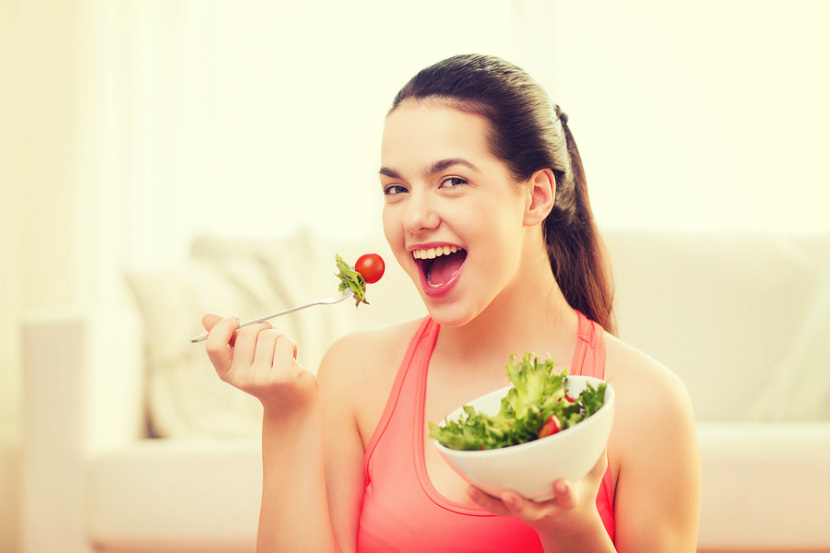
Serving healthy meals for your family can be a challenge if a family member, particularly a teen, decides to become a vegetarian. To support your teen's food choice, you may need to find new ways to prepare some family meals. Involving your teen in making his or her own meals can help them learn how to cook and prepare a nutritionally balanced meal. Teens need to know there's more to being a vegetarian than simply eliminating meat! And yes – they do need to eat their vegetables!!
It is the position of Dietitians of Canada and the American Dietetic Association that appropriately planned vegetarian diets are healthful, nutritionally adequate, and provide health benefits in the prevention and treatment of certain diseases.
What nutrients should vegetarian teens be concerned about?
All vegetarians, especially individuals who don't eat any animal products, need to be sure they get enough iron, calcium, vitamin D, vitamin B12, and zinc. Protein needs can easily be satisfied by eating a variety of beans, peas, lentils, soy products, nuts, seeds, as well as milk products and eggs.
Iron - choose whole grain breads and cereal, dark green leafy vegetables, dried fruit, eggs, beans, lentils, and nuts. To increase absorption of iron from plant foods eat vitamin C rich foods at the same time. For example: have cereal and orange juice for breakfast; add strawberries, kiwi fruit, sweet peppers, or tomatoes to dark leafy greens; make a vegetarian chili with tomatoes and beans.
Calcium and vitamin D - consume at least 2 cups of milk or fortified soy beverages each day. Some non-dairy foods also provide calcium including tofu made with calcium, broccoli, kale, Bok Choy, almonds or almond butter, and cooked beans (soy, white, navy, black, kidney) and calcium- fortified juice. Vegetarians who don't consume any milk and alternatives including fortified soy beverages can benefit from a calcium and vitamin D supplement.
Vitamin B12 – is found in animal foods such as milk and eggs. If animal foods are not consumed, look for foods that are fortified with vitamin B12 vitamin, such as fortified cereals, fortified soy milk, and fortified veggie 'meats', or take a vitamin B12 supplement.
Zinc – choose beans, lentils, nuts, seeds and whole grains. Milk, cheese, yogurt, and eggs all provide zinc.
A guide for planning vegetarian meals for teens 14 to 18 years of age
The eating pattern for vegetarian teens is no different than that recommended for non-vegetarian teens. The only difference is the types of foods selected. Aim to have the number of Food Guide Servings recommended by Eating Well with Canada's Food Guide.
Remember that the Food Guide is just that, a guide to healthy eating. In order to satisfy hunger associated with growth spurts, high activity levels, or for taller people, choose more whole grains and vegetables and fruits to satisfy your higher energy needs.
-
Vegetables and Fruit: 8 servings per day for males; 7 servings per day for females
-
Grain Products: 7 servings per day for males; 6 servings per day for females
-
Milk and Alternatives, such as fortified soy beverages: 3 to 4 servings per day for males and females
-
Meat and Alternatives: 3 servings per day for males: 2 servings per day for females
Check Eating Well with Canada's Food Guide to see what is considered a serving.
Meal Suggestions for Vegetarian Teens
-
Omelettes or frittatas made with vegetables such as asparagus, broccoli, mushroom, sweet peppers, and onions – serve with whole grain bread or toast and a glass of milk or fortified soy milk
-
Burritos or tacos made with kidney or black beans or refried beans
-
Stir fries made with tofu, vegetables, and nuts – enjoy with whole wheat couscous or brown rice
-
Salads made with leafy greens, chick peas, white or red kidney beans, nuts, vegetables, pasta, rice, couscous or barley
-
Falafels and hummus made with chick peas served with whole grain pita bread and salad, sweet peppers or carrots
-
Peanut or almond butter on whole wheat or multigrain bagels with banana or apple slices- with a glass of calcium fortified orange juice
-
Soups made with lentils, beans, and vegetables – serve with whole grain bread or crackers
-
Canned baked beans in tomato sauce with molasses served with toast, vegetables and dip
-
Casseroles made with beans or lentils, rice, corn, and tomatoes
-
Pizza topped with vegetables
-
Vegetarian chilli served with cornbread or couscous
-
Vegetarian lasagne
-
Soy milk smoothies with a banana, frozen berries and a splash of orange juice
Last Update – January 3, 2019